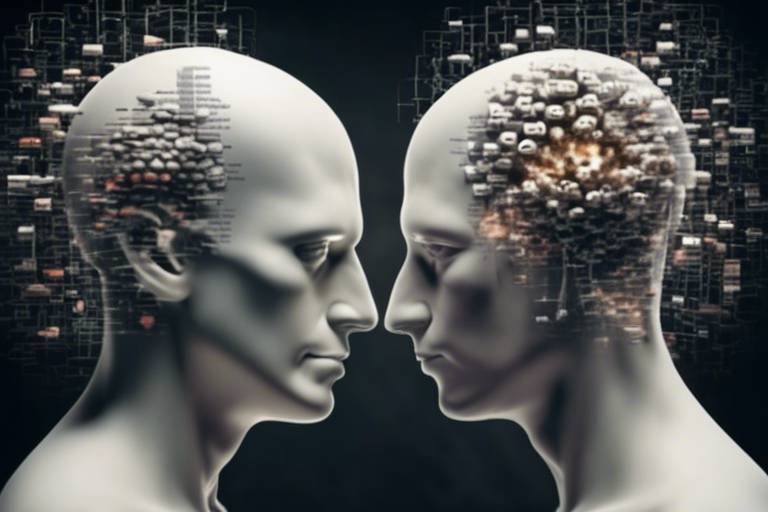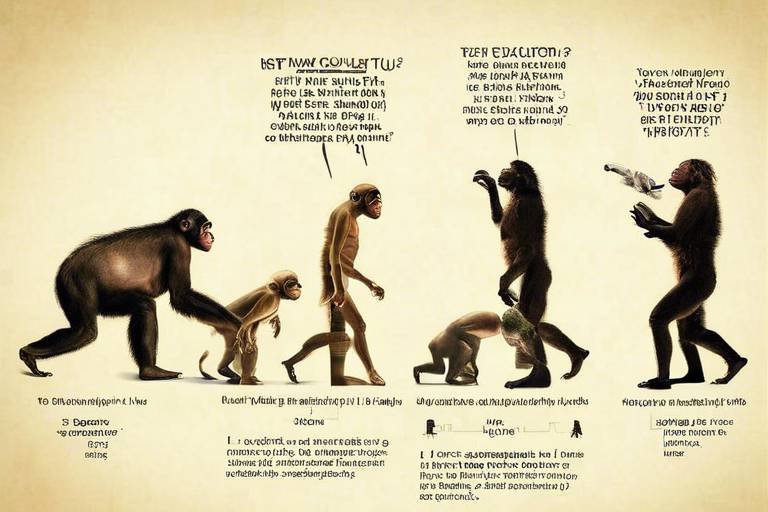The Relationship between Philosophy and Cognitive Psychology
The intricate relationship between philosophy and cognitive psychology is a fascinating journey through the realms of thought, consciousness, and understanding. At first glance, these two fields may seem distinct, with philosophy delving into the abstract and cognitive psychology focusing on the empirical study of the mind. However, they are deeply intertwined, each influencing the other in profound ways. This article aims to explore how philosophical inquiries shape psychological theories and how psychological findings can, in turn, inform philosophical thought. By examining this dynamic interplay, we can enrich our understanding of the mind and human behavior.
To grasp the significance of this relationship, we must consider the fundamental questions that both disciplines seek to answer. What is the nature of consciousness? How do we perceive reality? What constitutes knowledge? These questions are not merely academic; they are central to our understanding of ourselves and our interactions with the world. For instance, when cognitive psychologists study memory, they often draw on philosophical concepts of knowledge and belief to interpret their findings. Conversely, philosophers may rely on psychological research to ground their theories about the nature of the mind.
One of the most compelling aspects of this relationship is how historical context has shaped both fields. From ancient philosophers like Plato and Aristotle, who pondered the essence of human thought, to modern cognitive scientists investigating the neural underpinnings of cognition, the evolution of ideas has been a continuous dialogue. This historical trajectory reveals a rich tapestry of thought that informs contemporary discussions on cognition and consciousness.
Moreover, the implications of this relationship extend beyond theoretical discourse. In practical terms, the insights gained from cognitive psychology can inform ethical considerations in philosophy, particularly in areas such as artificial intelligence and mental health. As we develop more sophisticated cognitive models and AI systems, philosophical questions about autonomy, consciousness, and moral responsibility become increasingly relevant. Thus, the relationship between philosophy and cognitive psychology is not only academic but also has real-world implications that affect how we understand ourselves and our creations.
In summary, the relationship between philosophy and cognitive psychology is a complex and enriching one. By examining how these fields intersect, we can gain a deeper insight into the nature of the mind, the processes of thought, and the very essence of what it means to be human. This exploration is not just an intellectual exercise; it is a journey into the core of our existence.

Historical Context
To truly appreciate the intricate relationship between philosophy and cognitive psychology, it's essential to delve into their . The roots of cognitive psychology can be traced back to ancient philosophical inquiries that sought to understand the nature of the mind and human behavior. Philosophers like Plato and Aristotle laid down the groundwork for many psychological concepts that persist today. For instance, Plato's theory of forms introduced the idea that our perceptions are merely shadows of a more profound reality, which resonates with contemporary discussions on perception in cognitive psychology.
Fast forward to the Renaissance, where thinkers such as René Descartes revolutionized the way we think about the mind. His famous declaration, "Cogito, ergo sum" (I think, therefore I am), emphasizes the importance of thought as the foundation of existence. This idea not only sparked debates around consciousness but also paved the way for the development of rationalism, which remains a significant influence in cognitive psychology today.
As we move into the 19th century, the emergence of empiricism challenged rationalist views, highlighting the importance of sensory experience in the acquisition of knowledge. Philosophers like John Locke argued that the mind is a tabula rasa (blank slate) at birth, shaped by experience. This notion aligns closely with cognitive psychology’s focus on how we learn and process information, showcasing the ongoing dialogue between these two fields.
In the 20th century, the advent of behaviorism shifted the focus away from introspection and subjective experience, emphasizing observable behavior instead. However, this movement was met with criticism from philosophers who argued that ignoring mental processes oversimplified human behavior. The subsequent rise of cognitive psychology in the 1960s marked a return to the exploration of internal mental states, bridging the gap between philosophical inquiry and empirical research.
To illustrate the evolution of thought from ancient philosophy to contemporary cognitive science, consider the following table:
| Era | Philosophical Influence | Impact on Cognitive Psychology |
|---|---|---|
| Ancient Philosophy | Plato and Aristotle | Foundational concepts of perception and knowledge |
| Renaissance | René Descartes | Rationalism and the nature of consciousness |
| 19th Century | John Locke | Empiricism and the role of experience |
| 20th Century | Behaviorism | Shift to observable behavior, later challenged by cognitive approaches |
This historical overview illustrates how philosophical ideas have not only shaped the development of cognitive psychology but also how the two fields continue to inform each other. As we explore the key philosophical concepts in the next section, we will see how these foundational ideas manifest in contemporary psychological theories and practices.

Key Philosophical Concepts
When diving into the intricate world of cognitive psychology, it's impossible to overlook the profound impact of key philosophical concepts. These concepts serve as the backbone of our understanding of the mind, shaping theories and influencing research directions. For instance, consciousness, perception, and knowledge stand out as fundamental pillars that bridge the gap between philosophy and psychology. Each of these concepts not only enriches our comprehension of human experience but also raises critical questions about how we process information and interact with the world around us.
To start with, consciousness is a multifaceted phenomenon that has intrigued thinkers for centuries. What does it mean to be aware? How do we experience our thoughts and feelings? These questions are not merely academic; they cut to the core of what it means to be human. In cognitive psychology, understanding consciousness is essential for unraveling the complexities of mental processes. This is where the philosophical inquiry into the nature of consciousness becomes particularly relevant, as it informs psychological theories that seek to explain how we experience reality.
Next, let's consider perception. Philosophers have long debated whether our perceptions accurately reflect the external world or if they are merely constructs of our minds. This philosophical inquiry has significant implications for cognitive psychology, as it directly influences how we understand sensory information and its processing in the brain. For instance, the way we perceive colors, sounds, and even emotions can be shaped by both biological factors and our individual experiences. This interplay is crucial for psychologists who aim to develop a comprehensive understanding of human behavior.
Knowledge, too, plays a pivotal role in this discussion. Epistemology, the study of knowledge, raises essential questions about how we acquire information and what constitutes understanding. In cognitive psychology, this translates into exploring how we learn, remember, and apply knowledge. The philosophical debates surrounding the nature of knowledge—whether it is innate or acquired—have profound implications for educational psychology and cognitive development. For example, consider the contrasting views of nativism and empiricism, which suggest different pathways for acquiring knowledge. This philosophical backdrop informs various psychological approaches to learning and intelligence.
In summary, the relationship between these key philosophical concepts and cognitive psychology is not just academic; it's a dynamic interplay that enriches our understanding of the mind. By asking profound questions about consciousness, perception, and knowledge, both fields can collaborate to unravel the complexities of human thought and behavior. This synergy not only deepens our insights into mental processes but also lays the groundwork for future research and exploration.
- What is the relationship between philosophy and cognitive psychology?
Philosophy provides foundational questions and frameworks that inform cognitive psychology's exploration of the mind. - How does consciousness relate to cognitive psychology?
Consciousness is a central theme in cognitive psychology, influencing how we understand awareness and mental processes. - Why is perception important in cognitive psychology?
Perception affects how we interpret sensory information, which is crucial for understanding human behavior and cognition. - What role does knowledge play in cognitive psychology?
Knowledge influences learning and memory, and philosophical discussions on its nature inform psychological theories.

Mind-Body Dualism
When we dive into the concept of , we are venturing into one of the most fascinating and contentious debates in philosophy and psychology. At its core, mind-body dualism posits that the mind and body are two distinct entities that interact with each other. This idea, famously championed by René Descartes, raises profound questions about the nature of consciousness and existence. Are our thoughts and feelings merely the byproducts of physical processes in the brain, or do they exist as separate entities? This question has implications not only for philosophy but also for cognitive psychology, shaping how we understand mental processes and human behavior.
The implications of mind-body dualism extend far beyond theoretical discussions. For instance, consider how this dualistic view influences our understanding of mental health. If we see the mind as separate from the body, we might approach psychological disorders like depression or anxiety differently than if we viewed them as purely biochemical phenomena. This perspective can lead to varied treatment options, from medication that targets the brain's chemical imbalances to talk therapy that addresses the mind's complexities.
Moreover, mind-body dualism raises intriguing questions about consciousness. What does it mean to be conscious? Is consciousness a product of brain activity, or is it something more ethereal? These inquiries compel cognitive psychologists to explore not just the mechanics of mental processes but also the subjective experiences that define our humanity. In a sense, the debate mirrors a classic philosophical dilemma: Are we merely machines, or is there something uniquely human that transcends our physical form?
To further illustrate the impact of mind-body dualism, let’s take a look at a simple comparison:
| Aspect | Mind-Body Dualism | Materialism |
|---|---|---|
| Nature of Mind | Independent from the body | Dependent on physical processes |
| Consciousness | Separate entity | Byproduct of neural activity |
| Implications for Psychology | Focus on both mental and physical treatments | Emphasis on biological interventions |
The dualistic perspective has also spurred a wealth of philosophical inquiry into the nature of reality and perception. For example, how do we reconcile our subjective experiences with the objective world? This is where the interplay between philosophy and cognitive psychology becomes particularly rich. Philosophers like David Chalmers have explored concepts such as the "hard problem of consciousness," which questions why and how we have subjective experiences at all. Cognitive psychologists, on the other hand, might approach this problem through empirical research, examining how brain activity correlates with conscious thought.
In conclusion, mind-body dualism serves as a crucial framework for understanding the complex relationship between the mind and the body. It invites us to explore profound questions about our existence and the nature of consciousness, while also shaping practical approaches in cognitive psychology. As we continue to unravel the mysteries of the mind, the dialogue between philosophy and psychology remains essential, encouraging us to think critically about what it means to be human.

Descartes' Influence
René Descartes, often hailed as the father of modern philosophy, made profound contributions that continue to resonate in the realms of cognitive psychology today. His famous declaration, "Cogito, ergo sum" (I think, therefore I am), encapsulates the essence of self-awareness and consciousness, which are pivotal concepts in understanding the mind. Descartes' exploration of the nature of thought and existence has laid the groundwork for many psychological theories that seek to unravel the complexities of human cognition.
One of the key aspects of Descartes' influence is his advocacy for rationalism. He believed that reason is the primary source of knowledge, a perspective that has shaped cognitive psychology's emphasis on cognitive processes such as perception, reasoning, and problem-solving. In contrast to empiricism, which posits that knowledge comes primarily from sensory experience, Descartes argued that certain ideas are innate and can be understood through rational thought alone. This distinction is crucial as it highlights how cognitive psychologists investigate the interplay between innate knowledge and experiential learning.
Additionally, Descartes introduced the concept of mind-body dualism, suggesting that the mind and body are distinct entities that interact with one another. This idea has spurred extensive debates in cognitive psychology regarding the relationship between mental states and physical processes. For instance, how do thoughts influence bodily actions, and how do physical sensations affect our mental state? These questions are at the heart of cognitive psychology, prompting researchers to delve into the mechanisms of perception, emotion, and behavior.
Furthermore, Descartes' work on the nature of emotions and their connection to the mind has paved the way for modern psychological theories that explore emotional cognition. He posited that emotions are not merely feelings but are deeply intertwined with our thoughts and beliefs. This holistic view encourages cognitive psychologists to consider how cognitive processes shape emotional responses and vice versa. By understanding this relationship, psychologists can develop more effective therapeutic approaches that address both cognitive and emotional aspects of mental health.
Overall, Descartes' influence extends beyond mere philosophical discourse; it has significantly shaped the methodologies and frameworks used in cognitive psychology today. By challenging us to examine the nature of consciousness, self-awareness, and the mind-body connection, Descartes has left an indelible mark on the study of human cognition.
- What is the significance of Descartes in cognitive psychology? Descartes' ideas on rationalism and mind-body dualism have profoundly influenced theories on cognition, consciousness, and the relationship between mental and physical processes.
- How does Descartes' philosophy relate to modern psychological practices? His emphasis on reason and the nature of emotions informs contemporary approaches in cognitive therapy and understanding emotional cognition.
- What are some key concepts introduced by Descartes? Key concepts include rationalism, mind-body dualism, and the idea that certain knowledge is innate.

Materialism vs. Idealism
When we dive into the intriguing debate of materialism versus idealism, we are essentially exploring two distinct perspectives on the nature of reality and existence. Materialism posits that the only thing that truly exists is matter; everything, including our thoughts and consciousness, arises from physical processes. In contrast, idealism suggests that reality is fundamentally mental or spiritual; our perceptions and experiences shape the world around us. This philosophical dichotomy has significant implications for cognitive psychology, as it influences how we understand human experience and behavior.
To illustrate this further, consider the following key distinctions:
| Aspect | Materialism | Idealism |
|---|---|---|
| Nature of Reality | Physical existence is primary. | Mental or spiritual existence is primary. |
| Role of Consciousness | Consciousness is a product of brain activity. | Consciousness shapes and creates reality. |
| Implications for Psychology | Focus on biological and neurological processes. | Focus on subjective experiences and perceptions. |
This debate raises fascinating questions about how we perceive our own minds. For example, if we adopt a materialist viewpoint, we might focus on the neuroscience behind cognitive functions like memory and decision-making. However, from an idealist perspective, we might explore how our beliefs and perceptions influence our mental states and behaviors. This leads us to ponder: Are our thoughts merely byproducts of physical processes, or do they hold the power to shape our reality?
In cognitive psychology, understanding this interplay is crucial. Researchers often find themselves navigating between these two philosophies, trying to unravel the complex threads that connect our mental experiences with the physical world. The implications of this debate extend into various domains, including psychotherapy, where practitioners may choose to emphasize either the biological underpinnings of mental health issues or the subjective experiences of their clients.
Ultimately, the discussion of materialism versus idealism is not just an abstract philosophical exercise; it profoundly impacts how we approach human cognition and behavior. As cognitive psychology continues to evolve, integrating insights from both perspectives can lead to a more comprehensive understanding of the mind. This blend of ideas might help us grasp not only how we think but also why we think the way we do.
- What is materialism? Materialism is the philosophical view that only physical matter exists, and all phenomena, including consciousness, arise from material interactions.
- What is idealism? Idealism is the belief that reality is fundamentally mental or spiritual, emphasizing the role of consciousness in shaping our experiences.
- How do materialism and idealism relate to cognitive psychology? These philosophies influence how psychologists understand mental processes, either focusing on biological mechanisms or subjective experiences.
- Can both perspectives coexist in cognitive psychology? Yes, many psychologists integrate elements from both materialism and idealism to provide a more holistic view of cognition.

Epistemology and Cognition
Epistemology, the philosophical study of knowledge, plays a crucial role in understanding cognition and how we process information. At its core, epistemology asks fundamental questions: What is knowledge? How do we acquire it? And how can we be sure that what we know is true? These inquiries are not just abstract musings; they have practical implications for cognitive psychology, particularly in how we understand learning and memory.
Imagine trying to build a house without a blueprint. You might have some materials and tools, but without a clear plan, the structure is likely to be unstable. Similarly, without a solid grasp of epistemological principles, our understanding of cognitive processes can become chaotic and unfocused. Cognitive psychology relies heavily on epistemological frameworks to explore how we learn, remember, and apply knowledge in our daily lives.
One of the key aspects of epistemology is the distinction between different types of knowledge. For instance, we can categorize knowledge into:
- Propositional Knowledge: Knowledge of facts, such as "Water boils at 100 degrees Celsius."
- Procedural Knowledge: Knowledge of how to do things, like riding a bike or solving a math problem.
- Experiential Knowledge: Knowledge gained through personal experience, which can be subjective and unique to the individual.
This categorization is essential because cognitive psychology seeks to understand how these different types of knowledge are acquired, stored, and utilized. For example, when we learn a new skill, such as playing a musical instrument, we often start with propositional knowledge about music theory. Over time, through practice and experience, we develop procedural knowledge that allows us to play fluidly. This transition highlights the dynamic nature of cognition, where different types of knowledge interact and influence one another.
Moreover, epistemology emphasizes the importance of belief and justification in cognition. Not all beliefs are created equal; some are based on solid evidence while others are mere assumptions. Cognitive psychologists study how these beliefs affect our decision-making processes, problem-solving abilities, and even our emotional responses. Understanding the justification behind our beliefs can lead to better strategies for learning and memory retention.
In essence, the intersection of epistemology and cognition provides a rich framework for exploring how we think and learn. By examining the nature of knowledge and the processes involved in acquiring it, cognitive psychology can develop more effective educational methods and therapeutic approaches. As we continue to unravel the complexities of the mind, the insights gained from epistemology will undoubtedly enhance our understanding of human cognition.
- What is the relationship between epistemology and cognitive psychology?
Epistemology provides a framework for understanding how we acquire and validate knowledge, which is critical for cognitive psychology's exploration of learning and memory. - Why is knowledge important in cognitive psychology?
Knowledge is fundamental because it shapes our thought processes, influences our behavior, and affects how we interact with the world around us. - How does belief impact cognition?
Beliefs can significantly influence decision-making and problem-solving, and understanding the justification behind these beliefs can lead to improved cognitive strategies.

Philosophy of Mind
The is a fascinating field that delves into the nature of mental phenomena, including thoughts, emotions, and consciousness. It poses profound questions about what it means to think, feel, and be aware. This area of study is not just theoretical; it significantly influences how cognitive psychology approaches the understanding of mental processes and their underlying mechanisms. When we ponder the essence of our thoughts, we often find ourselves navigating through complex ideas that challenge our perceptions of reality.
One of the central themes in the philosophy of mind is the exploration of consciousness. What is consciousness? Is it merely a byproduct of brain activity, or does it possess an intrinsic quality that transcends physical processes? These questions are not just academic; they resonate with our everyday experiences. For instance, consider the moment you experience a sudden insight. It feels almost magical, doesn’t it? Yet, from a cognitive psychology perspective, this insight can be analyzed in terms of neural processes and cognitive functions. This interplay between subjective experience and objective analysis is what makes the philosophy of mind so captivating.
Furthermore, the philosophy of mind addresses the concept of intentionality, which refers to the capacity of the mind to represent objects and states of affairs. When you think about a loved one or plan your next meal, your thoughts are directed toward something specific. This directedness raises questions about how mental states relate to the world around us. Are our thoughts merely reflections of external realities, or do they hold a power of their own? Cognitive psychology seeks to bridge this gap, examining how our mental representations shape our understanding of the world and influence our behavior.
Another significant aspect of the philosophy of mind is its exploration of self-awareness. The ability to reflect on our thoughts and emotions is a hallmark of human cognition. Philosophers have long debated whether self-awareness is a unique trait of humans or if it can be found in other animals as well. This inquiry has profound implications for cognitive psychology, particularly when studying phenomena like metacognition, which is our awareness and understanding of our own thought processes. How we perceive ourselves and our cognitive capabilities can significantly affect our learning and decision-making.
Moreover, the philosophy of mind intersects with the study of artificial intelligence (AI). As we develop machines that can mimic human thought processes, ethical questions arise. Can a machine truly possess consciousness, or is it merely simulating human behavior? This debate is critical in cognitive psychology as it challenges our understanding of what it means to be "intelligent." The implications of AI extend beyond technology; they force us to reconsider our definitions of mind and consciousness. Are we prepared to accept that machines could one day share our cognitive experiences?
In conclusion, the philosophy of mind provides a rich framework for understanding the complexities of human cognition. By examining consciousness, intentionality, self-awareness, and the implications of artificial intelligence, we gain invaluable insights into the mind's workings. This philosophical inquiry not only enriches cognitive psychology but also invites us to reflect on our own mental experiences and the nature of reality itself.
- What is the main focus of the philosophy of mind? The philosophy of mind primarily investigates the nature of mental phenomena, consciousness, and the relationship between mind and body.
- How does the philosophy of mind influence cognitive psychology? It shapes the theoretical frameworks and methodologies used in cognitive psychology to study mental processes and experiences.
- What role does consciousness play in cognitive psychology? Consciousness is central to understanding subjective experiences and cognitive functions, influencing how we learn and interact with the world.
- Are there ethical concerns regarding artificial intelligence in relation to the philosophy of mind? Yes, the development of AI raises questions about consciousness, autonomy, and the implications of machines mimicking human thought processes.

Consciousness Studies
When we dive into the realm of , we embark on a fascinating journey that intersects both philosophy and cognitive psychology. This exploration seeks to unravel the mysteries of our subjective experiences, raising profound questions about what it means to be aware, to think, and to feel. Imagine consciousness as a vast ocean, where each wave represents a thought or emotion, constantly shifting and flowing, yet deeply interconnected. The study of consciousness isn't just about understanding these waves; it's about grasping the very essence of the ocean itself.
At the core of consciousness studies lies the inquiry into self-awareness. What does it mean to be aware of oneself? This question has puzzled philosophers and psychologists alike for centuries. Some argue that self-awareness is a unique trait of humans, while others suggest that it may extend to other species as well. This debate opens up a treasure trove of questions, such as:
- How do we define self-awareness?
- Can machines achieve self-awareness?
- What role does self-awareness play in our interactions with others?
Moreover, consciousness studies delve into the concept of intentionality, which refers to the capacity of the mind to be directed towards something. This notion is crucial in understanding how we form intentions, make decisions, and perceive the world around us. It raises intriguing questions like, "Are our thoughts merely products of neural processes, or do they reflect a deeper reality?" This philosophical inquiry directly influences cognitive psychology, as researchers seek to understand the mechanisms behind our thoughts and perceptions.
To illustrate the complexity of consciousness, consider the hard problem of consciousness, a term coined by philosopher David Chalmers. This problem highlights the difficulty of explaining why and how we have subjective experiences. While we can analyze the brain's functions and the neural correlates of consciousness, the question remains: why does it feel like something to be conscious? This inquiry pushes the boundaries of cognitive psychology, urging scientists to explore not only the mechanics of thought but also the qualitative aspects of consciousness.
Furthermore, consciousness studies are increasingly intersecting with advancements in technology, particularly in the realm of artificial intelligence. As we develop machines capable of complex tasks, we must ask ourselves: can these machines ever possess consciousness? This question isn't merely academic; it has real-world implications for ethics and our understanding of what it means to be human. The philosophical implications of consciousness in AI challenge us to rethink our definitions of consciousness, autonomy, and even morality.
In summary, consciousness studies serve as a bridge between philosophy and cognitive psychology, illuminating the intricate dynamics of our mental lives. Through the lens of self-awareness, intentionality, and the hard problem of consciousness, we gain deeper insights into the nature of our thoughts and feelings. As we continue to explore this captivating field, we are not just uncovering the mechanics of the mind; we are also engaging in a profound exploration of what it means to be alive and aware.
- What is consciousness?
Consciousness refers to the state of being aware of and able to think about one's own existence, thoughts, and surroundings. - Why is self-awareness important?
Self-awareness allows individuals to reflect on their thoughts and behaviors, leading to personal growth and improved social interactions. - Can machines be conscious?
This is a debated topic; while machines can simulate aspects of consciousness, whether they can truly experience it remains uncertain. - What is the hard problem of consciousness?
The hard problem refers to the challenge of explaining why and how we have subjective experiences, despite understanding the brain's functions.

Artificial Intelligence and Ethics
As we dive into the fascinating world of artificial intelligence (AI), the intersection of philosophy and cognitive psychology becomes increasingly relevant. The rapid advancements in AI technology have sparked a plethora of ethical dilemmas that challenge our understanding of consciousness, autonomy, and the very nature of intelligence itself. Imagine a world where machines not only perform tasks but also exhibit behaviors that mimic human thought processes. This raises the question: if a machine can think, does it possess consciousness? And if so, what rights should it have?
One of the most pressing ethical concerns in AI revolves around the concept of autonomy. As machines become more capable of making decisions, we must consider the implications of these decisions on human lives. For instance, in the realm of autonomous vehicles, who is responsible if an AI makes a decision that leads to an accident? This dilemma is not just a legal issue; it also touches on the philosophical debates about moral responsibility. Do we hold the creators accountable, or does the AI itself bear some responsibility?
Moreover, the development of AI systems that can learn and adapt raises questions about the ethical treatment of these entities. Should we consider the emotional and intellectual capabilities of AI? If a machine can simulate emotions or demonstrate learning, does it warrant ethical consideration akin to that of living beings? These questions are not merely academic; they have real-world implications for how we design and implement AI technologies.
To further illustrate these ethical dilemmas, let's examine some key questions that arise at the intersection of AI and ethics:
- What constitutes consciousness in AI, and how do we measure it?
- Should AI systems have rights similar to those of humans?
- How do we ensure that AI decisions align with human values and ethics?
- What safeguards can we implement to prevent misuse of AI technologies?
As cognitive psychology continues to evolve alongside AI, understanding the implications of these technologies on human cognition becomes essential. The philosophical inquiries surrounding AI not only enrich our understanding of intelligence but also compel us to reflect on our responsibilities as creators. Just as philosophers have long debated the nature of the mind, we must now consider the minds we are creating. The future of AI isn't just about technology; it's about what it means to be human in a world where machines are increasingly capable of mimicking our thoughts and behaviors.
In conclusion, the dialogue between philosophy, cognitive psychology, and artificial intelligence is vital for navigating the ethical landscape of our future. As we continue to push the boundaries of what machines can do, we must also grapple with the profound questions of consciousness, ethics, and our role in shaping the minds of tomorrow.
- What is the relationship between AI and cognitive psychology?
AI and cognitive psychology intersect in exploring how machines can replicate human thought processes and what this means for our understanding of the mind. - Are AI systems capable of consciousness?
The question of AI consciousness is complex and remains a topic of philosophical debate, as current AI lacks subjective experience. - What ethical considerations arise with AI development?
Ethical considerations include autonomy, responsibility for decisions made by AI, and the potential rights of intelligent systems. - How can we ensure AI aligns with human values?
Implementing ethical guidelines and involving diverse perspectives in AI development can help align technology with human values.
Frequently Asked Questions
- What is the relationship between philosophy and cognitive psychology?
The relationship is quite intricate! Philosophy provides the foundational questions and frameworks that cognitive psychology uses to explore the mind. For instance, philosophical inquiries about consciousness and perception directly influence how psychologists study these phenomena. It's like philosophy lays the groundwork, while cognitive psychology builds the house!
- How has historical context shaped cognitive psychology?
Understanding the historical context is crucial because it reveals how ancient philosophical ideas have evolved into modern psychological theories. Think of it like a long journey; each philosopher contributed a piece to the puzzle, leading us to contemporary cognitive science. Without this historical perspective, we might miss the rich tapestry of thought that informs current practices!
- What are some key philosophical concepts relevant to cognitive psychology?
Key concepts include consciousness, perception, and knowledge. These ideas are not just abstract; they are vital for understanding mental processes. For example, how we perceive the world influences our cognitive functions, making these philosophical discussions essential for psychologists trying to unravel the complexities of human behavior.
- What is mind-body dualism, and why is it important?
Mind-body dualism explores the relationship between mental states and physical processes. This philosophical debate is crucial for cognitive psychology as it helps us understand how our thoughts and emotions interact with our physical bodies. It's like trying to figure out how a computer (the body) and the software (the mind) work together to produce results!
- How did Descartes influence modern cognitive psychology?
René Descartes' ideas on rationalism and the nature of the self have left a lasting mark on cognitive psychology. His famous assertion "I think, therefore I am" highlights the importance of thought in understanding existence. This notion continues to fuel discussions about cognition and self-awareness today!
- What is the debate between materialism and idealism?
This debate revolves around the nature of reality and perception. Materialism posits that only physical matter exists, while idealism suggests that reality is mentally constructed. This philosophical clash poses significant questions for cognitive psychology, especially in understanding how we perceive and interpret our experiences.
- How does epistemology relate to cognitive psychology?
Epistemology, the study of knowledge, is essential for cognitive psychology as it addresses how we acquire and process information. It’s like the compass that guides psychologists in understanding learning and memory, helping them figure out how we know what we know!
- What is the philosophy of mind?
The philosophy of mind examines mental phenomena such as thoughts and emotions. This area significantly shapes cognitive psychology's approach to understanding mental processes. Think of it as the bridge connecting our internal experiences with the external world!
- How are consciousness studies relevant to cognitive psychology?
Consciousness studies provide a framework for exploring subjective experiences. They raise intriguing questions about self-awareness and intentionality that are central to cognitive psychology. It’s like shining a flashlight on the dark corners of our minds to uncover what truly makes us tick!
- What ethical questions arise from the intersection of artificial intelligence and cognitive psychology?
The intersection raises questions about consciousness, autonomy, and the implications of machine learning. As machines become more advanced, discussions about their cognitive capabilities and ethical considerations become increasingly important. It’s like navigating uncharted waters where we must decide how to balance human and machine cognition responsibly!



















